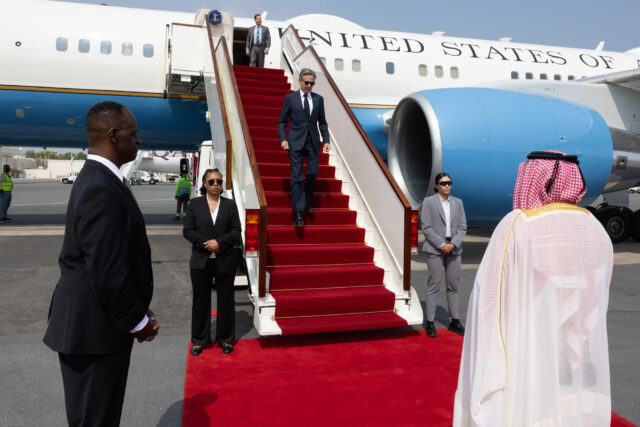
He’s gone. US Secretary of State Antony Blinken went to Qatar and then to Jordan to dissect his meetings in Israel. What have we learned? What has he learned?
Israeli Prime Minister Benjamin Netanyahu politely called the talks with Blinken “friendly and productive.” Indeed, Blinken started with, “Israel has achieved important strategic objectives to ensure that October 7th can never happen again.” But he quickly moved on.
“Now is the time to end the war, get the hostages home, and chart a new path forward that enables the Palestinian people to rebuild their lives.”
According to a State Department spokesman, Blinken told Israel “to capitalize on” the killing of Hamas’ leader, Yahya Sinwar, by “ending the war.” He also demanded that the Israeli Prime Minister disavow a proposal by an IDF general for a “buffer zone” in northern Gaza. They discussed “ongoing efforts” in Lebanon to “reach a diplomatic resolution along the Blue Line that includes full implementation of U.N. Security Council Resolution 1701 and allows civilians on both sides of the border to return to their homes.”
Second point first: Blinken missed the fact that Hezbollah started the war, and that all of the illegality – all of the terror and rocket attacks, the weapons-caching, the internationally outlawed activity housing military arsenals inside civilian spaces and shelling civilian homes in the Galilee – is going on north of the Blue Line. Hezbollah and Iran, by the way, reject ceasefire talks altogether.
First point: Sinwar’s death has little to do with “ending the war” at the moment. There are no ceasefire talks that might end in a release of the hostages. The New York Times helpfully justified Hamas’ reticence, reminding its readers that “it remained unclear whether Hamas was willing to re-engage in the long-stalled talks after Israel killed its leader.”
It doesn’t really matter. Hamas is still shooting at the IDF and its own civilians, and still stealing food and medical aid.
So, the war continues.
Hamas had been reestablishing itself in north Gaza, primarily in the Jabaliya refugee camp, making the Palestinian civilian population into human shields, as they were before. And when hundreds of Gazans headed toward the safe zones in the south, as instructed by the IDF, the incubi of Hamas shot at the fleeing civilians.
The IDF tended to the wounded.
In the past two weeks, the IDF has neutralized approximately 300 terrorists; hundreds more surrendered. Most are Hamas but there are also members of the Palestinian Islamic Jihad (PIJ). The IDF believes the current operation will help ensure that Hamas a) will no longer be able to fire rockets at Israel from Gaza, and b) will no longer be able to dominate, steal, and sell humanitarian aid.
That last point should make Secretary Blinken happy – as the administration has been blaming Israel for food shortages in north Gaza.
In a letter dated October 13, the Biden administration warned that Israel must “reverse the downward humanitarian trajectory” or there would be “implications” for the future disbursement of “U.S. ordnance and financial aid.”
The State Department has designated staff to audit Israel’s delivery of aid to Gaza – though no similar audit of Hamas thievery appears to have occurred.
“We’ve had periods before where the Israelis have increased what they’re doing only to see it fall back,” said Blinken – with no comment about how Hamas behavior might conceivably impact deliveries.
National Security Advisor Jake Sullivan, on NBC News, warned Israel to “balance its security concerns with humanitarian obligations.” He balanced his urging with a warning that the international community is watching.
The “international community” should, in fact, be watching the actual culprit: Hamas.
Yes, there are hungry people in the middle of the battle that Hamas has chosen to inflict on its people, but there is no famine, no starvation, and Israel has done an extraordinary job supplying food and medicine to the people. The UN and its friends, less so in the distribution.
After Blinken’s return to Washington, it is always worth quoting Sir Winston Churchill: “It is not the beginning of the end, but it may be the end of the beginning.”
Chair of urban warfare studies at West Point, John Spencer, was a bit more optimistic:
Hamas is clearly broken … But peace only ultimately comes if Hamas is prevented from regaining political or military power in Gaza. This could be the beginning of the end, though a lot still must happen.
Spencer concludes:
Wars are won when the enemy loses the means and will to continue fighting violently toward what are in essence political goals. There will be no cease in the cycle of violence without the full military and political defeat of Hamas.
In sum, in his 11th visit to Israel since the 10/7 Hamas pogrom, Blinken shows evidence that he learned little in the first 10.

